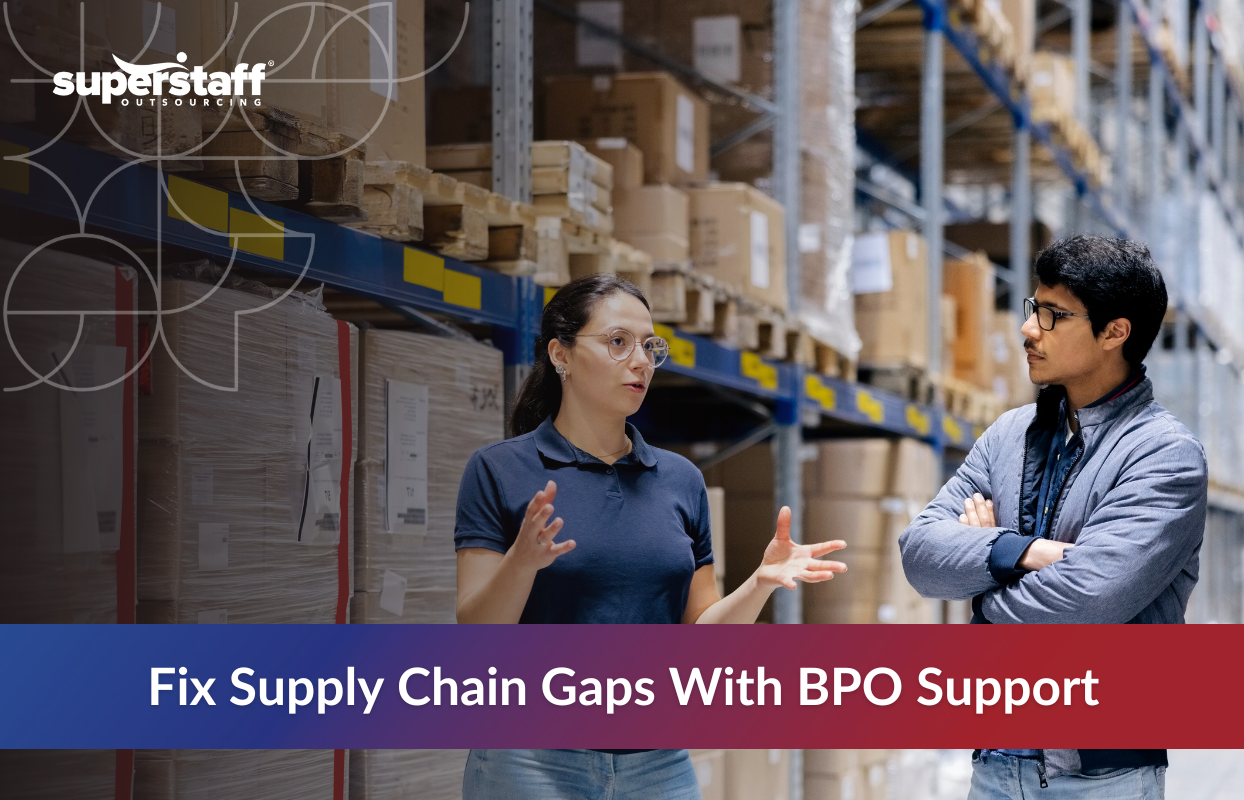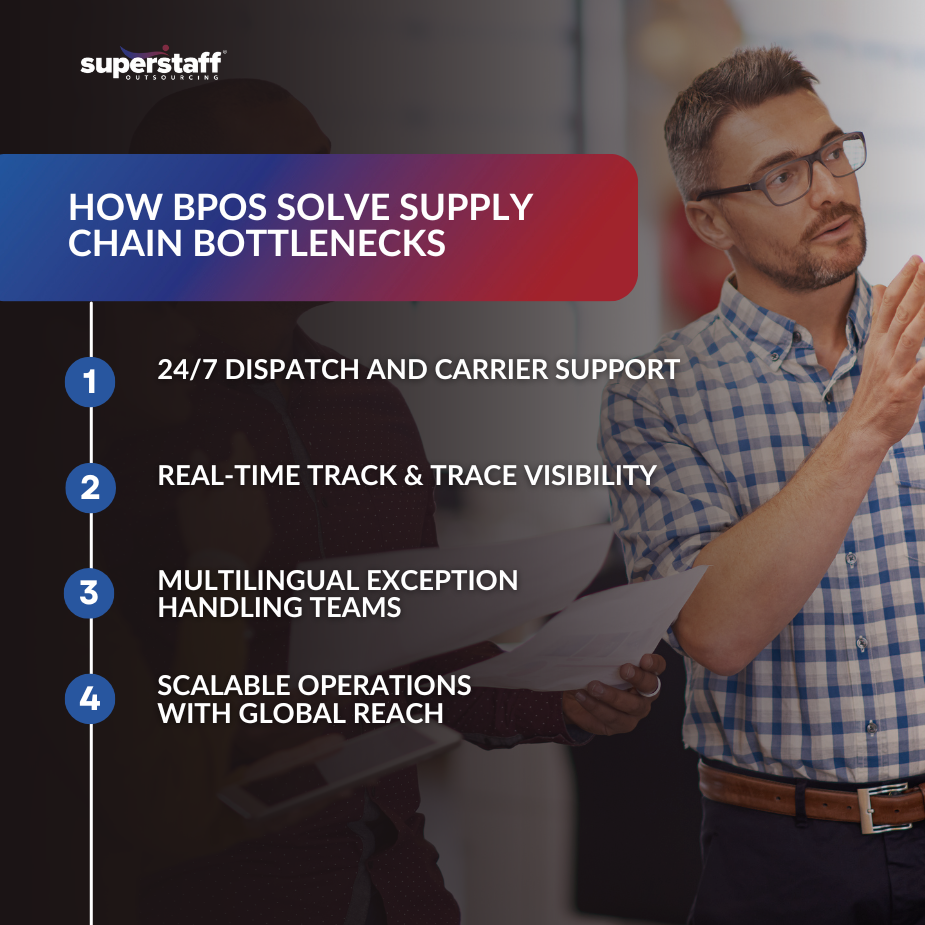
Global supply chains have been stretched to the breaking point—but IT services outsourcing is helping companies regain control. In recent years, supply chains have become a top concern for businesses worldwide. From the aftershocks of a global pandemic to geopolitical tensions and shifting consumer expectations, the once-reliable flow of goods has turned into a test of resilience and agility.
Business process outsourcing (BPO) has evolved beyond a back-office cost-saving tool. Today, it’s a frontline strategy—particularly when paired with IT services outsourcing—to restore efficiency, improve visibility, and enhance flexibility across supply chain operations. In this blog, we’ll explore how BPOs are providing smart, scalable solutions that help companies overcome bottlenecks and future-proof their supply chains.

The Root Causes of Today’s Supply Chain Chaos
Understanding the origins of modern supply chain disruptions is key to finding long-term solutions. A convergence of events over the past five years has led to widespread breakdowns in logistics networks.
- Pandemic shutdowns and port congestion: COVID-19 triggered factory closures, labor shortages, and border controls, leading to severe delays.
- Volatile demand and inventory imbalances: Consumer behavior shifted rapidly, leaving many companies with too much or too little inventory.
- Geopolitical instability and trade restrictions: Global tensions, trade wars, and sanctions have disrupted established supply chain routes.
- Limited labor and logistics workforce: Shortages of truck drivers, warehouse workers, and logistics coordinators persist.
- Fragmented data and outdated systems: Many organizations still rely on legacy tools that prevent real-time collaboration and visibility.
These challenges demand more than short-term fixes. They require smarter, more agile support structures that can respond quickly and efficiently to constant change.
The Strategic Role of BPOs in Supply Chain Operations
BPOs are filling critical gaps in logistics workflows by offering speed, specialization, and scalability. Companies are increasingly outsourcing essential support functions to BPO partners to handle complexity and reduce risk.
These functions include:
- Dispatch and carrier coordination: Managing route assignments, coordinating with carriers, and resolving delays.
- Shipment tracking and document verification: Ensuring on-time deliveries and maintaining compliance with customs and industry regulations.
- Order management and exception handling: Supporting order-to-cash processes with accurate, timely intervention.
BPOs provide:
- 24/7 global coverage: With operations across time zones, BPO teams offer round-the-clock monitoring and support.
- Multilingual capabilities: Serving global customers with culturally competent communication.
- Scalable staffing models: Expanding or contracting support teams based on seasonal demand or unexpected surges.
- Specialized data management: Accurate data entry, reporting, and logistics analytics to support decision-making.
These services offer more than efficiency—they provide peace of mind that logistics operations won’t fall through the cracks.
Tech-Enabled Visibility and Real-Time Decision Making
One of the greatest advantages BPOs bring to the table is real-time supply chain visibility. Tech-savvy BPO providers integrate directly with clients’ logistics systems to offer dynamic, transparent operations.
Through partnerships with BPOs, businesses gain access to:
- Integration with TMS, WMS, and ERP platforms: Seamless data exchange ensures all stakeholders are on the same page.
- Real-time track & trace: Monitoring inbound and outbound shipments across all transportation modes.
- Predictive alerts: Early warning systems for delays, weather disruptions, or port congestion.
- Custom reporting dashboards: Tailored views of KPIs, exceptions, and compliance status.
With better visibility comes faster, more informed decision-making. Whether rerouting shipments or reallocating inventory, businesses can act decisively with data-backed insight.
Cost Efficiency Without Sacrificing Quality
BPOs help reduce operational costs while maintaining (or even improving) quality and responsiveness. Labor arbitrage is just the beginning—the real value lies in optimizing processes for scale and sustainability.
Key benefits include:
- Lower labor costs without losing expertise: Access to skilled logistics professionals in cost-effective markets.
- Shared service models: Multiple clients benefit from best practices and efficiencies built into BPO operations.
- Remote support for multiple geographies: One offshore team can support logistics across continents.
- Pay-as-you-scale flexibility: Businesses pay for the resources they need, when they need them.
These savings create reinvestment opportunities—whether in technology upgrades, supply diversification, or customer experience improvements.
Real-World Examples of BPO Impact in Supply Chains
Companies across industries are partnering with BPOs to overcome specific logistics challenges. These case studies demonstrate the practical impact of outsourcing supply chain support.
- Retail: A U.S.-based fashion retailer reduced its order-to-cash cycle time by 40% after outsourcing its order management to a BPO partner. The outsourced team streamlined invoicing, reduced errors, and provided real-time order updates.
- Manufacturing: A heavy equipment manufacturer eliminated costly port delays by outsourcing 24/7 document processing and customs support. The BPO team ensured all shipment paperwork was complete, reducing dwell time and avoiding demurrage fees.
- E-commerce: A global online marketplace improved customer satisfaction scores by 25% through proactive shipment tracking updates and automated exception resolution. Their BPO partner integrated with carriers to send real-time notifications to end customers.
These stories show how BPOs don’t just support the supply chain—they strengthen it.
Choosing a BPO Partner for Supply Chain Support
Selecting the right BPO partner is critical to solving supply chain bottlenecks long-term. The wrong fit can lead to delays, data disconnects, and frustrated stakeholders. The right one can transform your operations.
Here are key evaluation criteria:
- Industry-specific knowledge: Look for BPOs with proven experience in logistics, freight forwarding, or warehousing.
- Tech stack compatibility: Ensure seamless integration with your existing platforms and future digital transformation plans.
- Flexible service models: Choose a provider that can scale services and adapt to your seasonal or regional needs.
- Strong SLAs and communication protocols: Clear expectations, rapid issue resolution, and regular performance reviews are must-haves.
- Capacity for data analytics: The ability to turn data into insights is what turns reactive support into proactive strategy.
Choosing a BPO isn’t just about outsourcing tasks. It’s about building a collaborative relationship that aligns with your operational goals and long-term vision.
SuperStaff: Your Best Best for IT Services Outsourcing
In today’s unpredictable global market, BPOs are proving essential in restoring order and resilience to supply chains. As companies continue to navigate labor shortages, economic uncertainty, and rising consumer expectations, the need for agile, tech-driven support has never been clearer.
Outsourcing supply chain support functions to capable BPO partners can:
- Improve real-time visibility and decision-making
- Lower operational costs and enhance flexibility
- Strengthen logistics coordination and documentation
- Turn reactive operations into proactive management
The chaos of today doesn’t have to define tomorrow. Explore how a BPO partnership can turn your supply chain into a source of competitive advantage—and give your team the control it needs to thrive.






